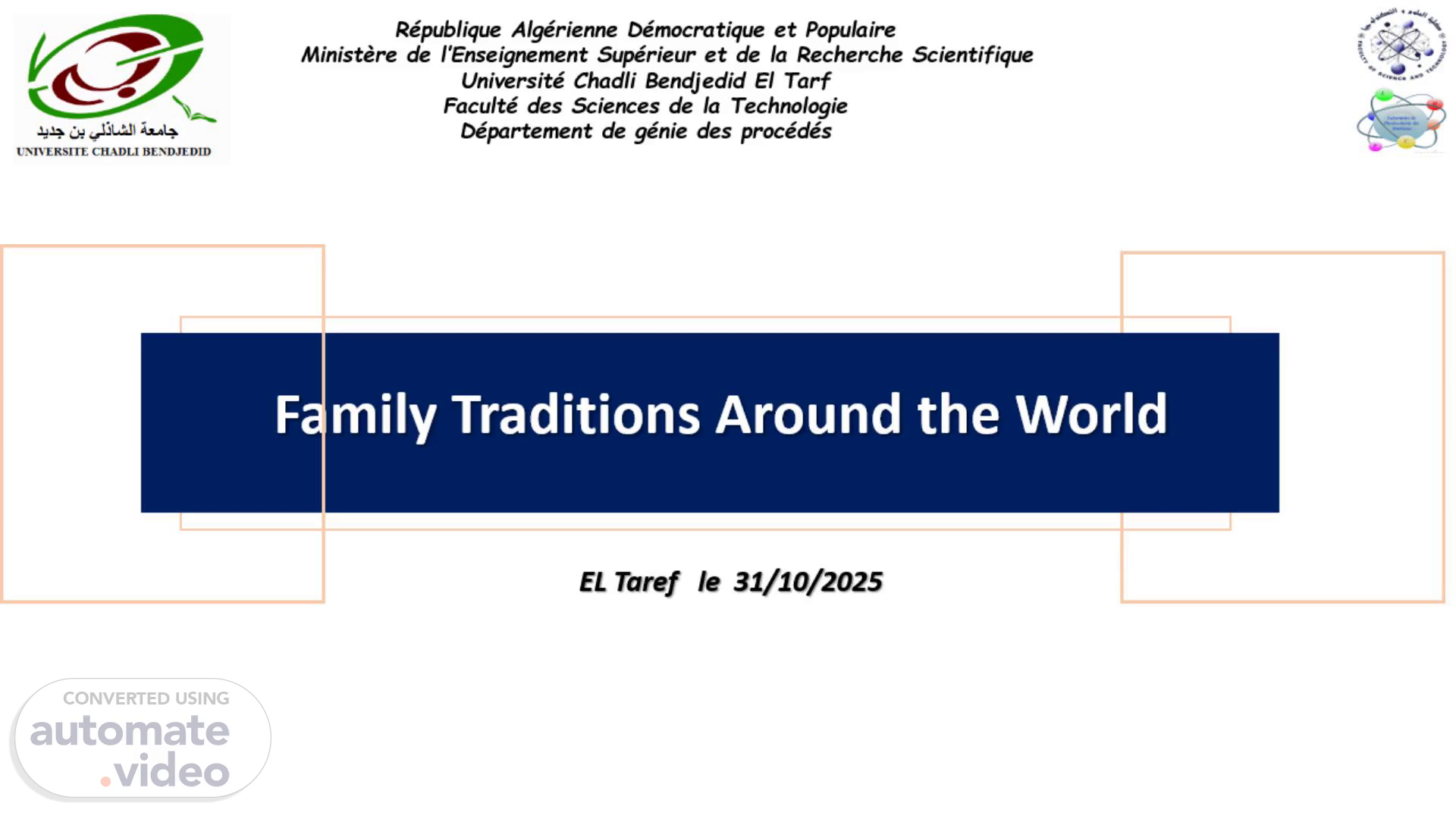Scene 1 (0s)
[Audio] République Algérienne Démocratique et Populaire Ministère de l’Enseignement Supérieur et de la Recherche Scientifique Université Chadli Bendjedid El Tarf Faculté des Sciences de la Technologie Département de génie des procédés Family Traditions Around the World EL Taref le 31/10/2025 Présenté par: KADRI Aicha.
Scene 2 (23s)
[Audio] Family Traditions Around the World: A Global Tapestry of Culture and Connection.
Scene 3 (32s)
[Audio] What Are Family Traditions? Family traditions: Repeated practices that bond relatives across generations. Transmit values, identity, and a sense of belonging. Mark life stages, seasons, faith, and community roles. Adapt over time while retaining core meaning..
Scene 4 (54s)
[Audio] Celebrating Kwanzaa: Embracing Unity, Culture, and Community. - Shades of Afrika Online Celebrating Kwanzaa: Embracing Unity, Culture, and Community. - Shades of Afrika Online Africa: Community, Ceremony, and Continuity In Ghana, the Akan baby-naming ceremony welcomes newborns with music, dance, and ancestral blessings, reinforcing lineage and identity. South African families often celebrate Ubuntu, a philosophy meaning "I am because we are," emphasising communal support and interconnectedness. Nigerian extended families share economic responsibilities, with elders playing key roles in decision-making and conflict resolution..
Scene 5 (1m 45s)
[Audio] Muslim Family Traditions: Faith and Festivity The Bismillah ceremony marks a Muslim child's first Quranic reading, blending spiritual initiation with family celebration. Eid al-Fitr and Eid al-Adha are pivotal family festivals involving communal prayers, feasting, gift-giving, and acts of charity. Marriage customs often include the Nikah ceremony, where families negotiate and celebrate the union with rich cultural rituals varying by region..
Scene 6 (2m 17s)
[Audio] Asia: Harmony, Respect, and Ritual In China, the Lunar New Year family reunion dinner is a sacred tradition symbolising unity and prosperity, with ancestral veneration central to the event. Indian families observe elaborate wedding rituals like the Saat Phere (seven vows) around a sacred fire, reflecting spiritual and social bonds. Japanese families practice the tea ceremony, a ritual of hospitality and mindfulness that strengthens social ties and respect..
Scene 7 (2m 49s)
[Audio] Americas: Diversity in Family and Festivity Native American families often hold naming ceremonies and vision quests that connect individuals to their tribe and spiritual heritage. In Mexico, Día de los Muertos (Day of the Dead) is a vibrant family tradition honouring ancestors with altars, food, and storytelling. North American families celebrate Thanksgiving as a time for gathering, gratitude, and sharing cultural narratives across generations..
Scene 8 (3m 22s)
[Audio] Europe: Tradition Meets Modernity In the UK, christenings and Sunday family dinners remain important for bonding and cultural continuity. Italian families cherish the Sunday pranzo, a large family meal fostering intergenerational connection and culinary heritage. Scandinavian countries celebrate Midsummer with family gatherings, dancing around maypoles, and feasting, blending pagan roots with modern customs..
Scene 9 (3m 50s)
[Audio] Pacific Islands: Nature, Kinship, and Ceremony In Samoa, the Fa'a Samoa (The Samoan Way) governs family life, emphasising respect, communal living, and ceremonial gift exchanges called 'fa'alavelave.' Maori families in New Zealand hold pōwhiri (welcome ceremonies) to greet guests, reinforcing tribal identity and hospitality. Hawaiian families celebrate Ohana, where extended family ties and shared responsibility are central to social life and cultural preservation..
Scene 10 (4m 28s)
[Audio] Common Threads: Values Across Cultures Respect for elders is a universal pillar, shaping family roles and decision-making worldwide. Rituals marking life stages—birth, coming-of-age, marriage, and death—serve to strengthen identity and community bonds. Food and shared meals are powerful symbols of unity, celebration, and cultural transmission in every region..
Scene 11 (4m 56s)
[Audio] Challenges and Evolution of Family Traditions Globalisation and migration influence family structures and traditions, blending old customs with new realities. Digital communication helps diaspora families maintain cultural practices despite distance. Efforts to preserve intangible cultural heritage, like UNESCO’s safeguarding initiatives, highlight the importance of family traditions in sustaining identity..
Scene 12 (5m 26s)
[Audio] Conclusion: Celebrating Our Shared Humanity Through Family Traditions Family traditions worldwide reveal the rich diversity and common humanity that connect us all. By understanding and respecting these customs, we foster empathy, cultural appreciation, and stronger global communities. Let us cherish and share our family stories, keeping alive the vibrant tapestry of human culture for generations to come..
